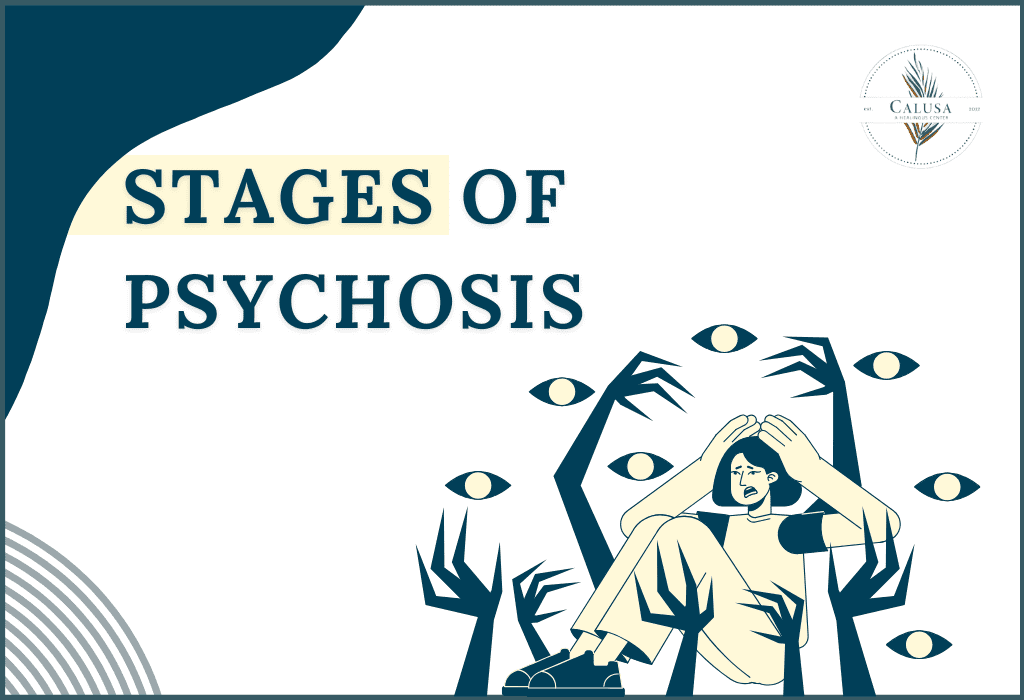This blog will help you understand what Psychosis is and what the 5 stages of Psychosis are. Imagine walking up to a street where everyone appears to be a stranger. Where everything that happens around suddenly seems to be unreal. That’s what Psychosis feels like—a cloak of imagination and delusions.
Research by the Centre for Addiction and Mental Health shows that 3 out of every 100 people experience an episode of Psychosis in their lifetime. The first episode usually appears in a person’s late teens or early twenties. This disorder drowns a person into a sea of unreal thoughts and delusions. The state of Psychosis often creates chaos in one’s work and social life. It alters one’s perception of reality. However, one can deal with it mindfully, lowering the possible damages by taking an early action. This blog navigates through the 5 stages of Psychosis, exploring its unique characteristics, challenges, and implications. Read further to find out a remedy for living a psychosis-free life.
You can get back to the real you!
Begin a treatment journey built around your specific needs and recovery goal.
Introduction To Psychosis
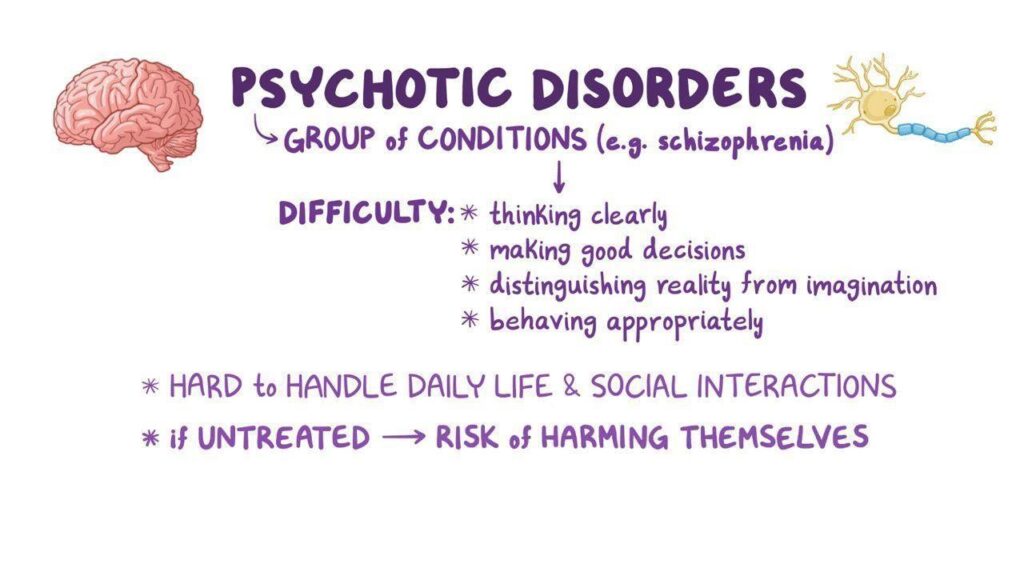
We identify Psychosis as a psychological disorder where a person perceives reality differently from others. People with Psychosis often experience hallucinations, delusions, and negative thinking. As per a report by the National Institute of Mental Health, there is no one cause of Psychosis, and a combination of genetic predisposition, brain development differences, and stress or trauma can cause it. A person who has Psychosis struggles to function normally in day-to-day life and finds it challenging to participate in social activities. Some of the reasons for the same can be a drug use history or the result of a past chronic condition. Some often develop this condition as a side effect of drug use or substance use. Psychosis should be treated at the earliest as delayed treatment can worsen the symptoms and turn them into fatal ones. It can also lead to the development of suicidal thoughts or self-harming behavior. Therefore, it’s essential to have control of the condition before it surpasses the danger stage. There are, in total, 5 stages of Psychosis an individual passes through.
Understanding The 5 Stages Of Psychosis
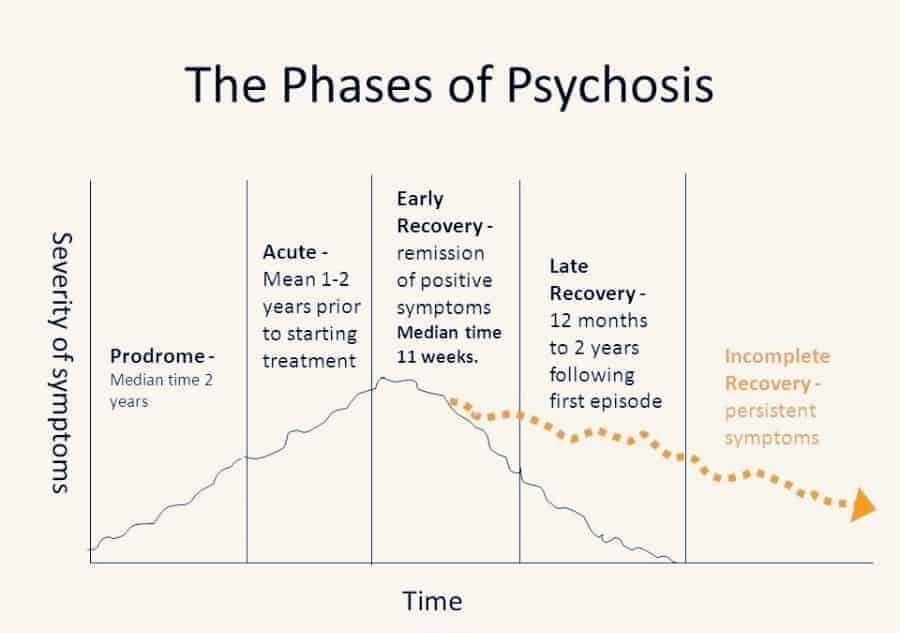
1. Prodromal Stage (Early stage)
The prodromal stage is the initial stage of the 5 stages of Psychosis, where a person experiences unusual changes in their behavior. These changes may include uneasiness, excitement, hyperactivity, withdrawal from social situations, and talking in rambling rants. These changes are usually mild and do not require a full-blown diagnosis.
2. Acute Phase (Being Overwhelmed by the psychosis)
We categorize this stage as “critical” or “acute”. During the critical period, the initial symptoms become severe and turn into a complete psychotic episode. The symptoms of this episode include hallucinations, delusion, anxiety, and confrontation. It serves as a warning sign for the individual and their loved ones to be aware of behavior changes and take immediate action before things worsen.
3. Stabilization Stage (Struggling with psychosis vulnerability)
Decreased symptoms characterize this stage, increased overall well-being, and a return to some degree of control over one’s life. With continued treatment, appropriate self-care, and support from friends and family, the individual can fully recover from their post-traumatic stress symptoms. However, one needs to be careful not to let the symptoms get back, as relapse is quite common after the recovery.
4. Recovery Stage (Living with psychosis vulnerability)
Now that the crisis has passed, it’s time to move on to the next stage. Here, the person’s focus shifts from recovery to return to the “normal.” One of the questions that people may have at this stage is whether or not to continue taking medication. Another issue is that family and friends can start acting strange and overprotective. Doctors, counselors, and other healthcare providers can work with individuals at this stage to help them recover and be alert to future signs.
5. Long-term Management Stage (Life after psychosis)
The long-term management stage is the final stage of the 5 stages of Psychosis, where the person is fully aware of what has happened to them, what their condition is, and what to do if it happens again. It can take many months or even years to reach this point. However, this stage can be a compelling moment in a person’s life, where they become aware of their vulnerabilities and strengths and become mentally stronger.
Symptoms Of Psychosis
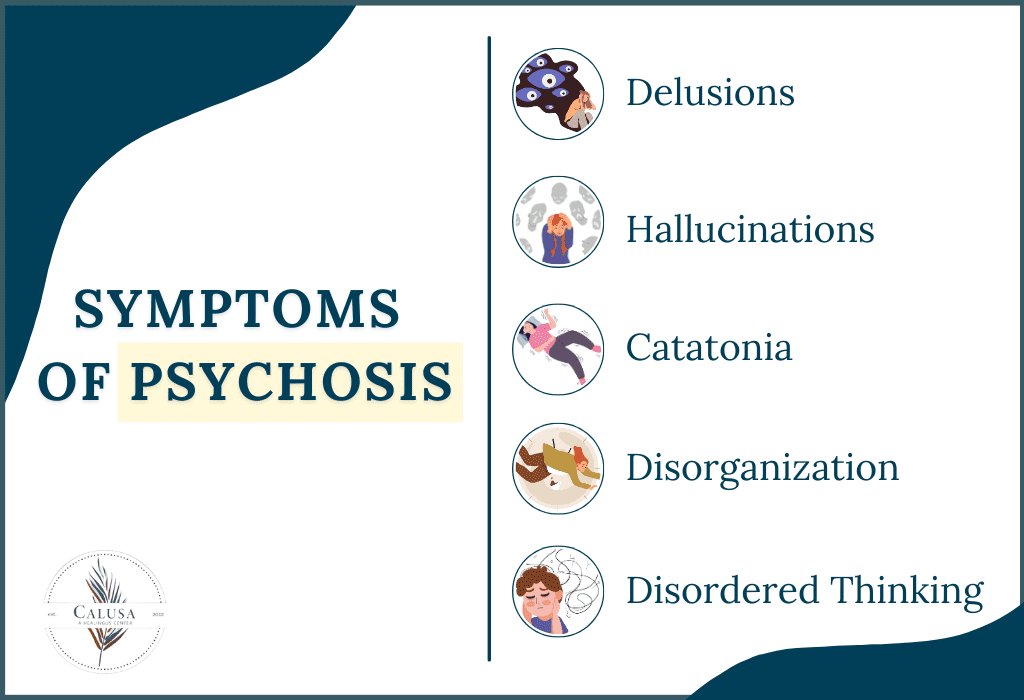
The 5 stages of Psychosis bring different warning signals of symptoms at each stage. As per the National Institute of Mental Health, one can identify the signs of psychotic disorder in a person through these symptoms.
- Changes in thinking, mood, and behavior frequently
- Trouble in processing of information or thinking clearly
- Dizzy thoughts and a confused state of mind
- Getting lost in delusions and hallucinations
- Mood swings are common, and one may feel unusually excited or depressed
- They behave differently than they usually do and act highly active or lazy
- Having difficulty communicating self-thoughts and opinions
- Difficulty in differentiating reality from fantasy
Treatment Options For 5 Stages Of Psychosis
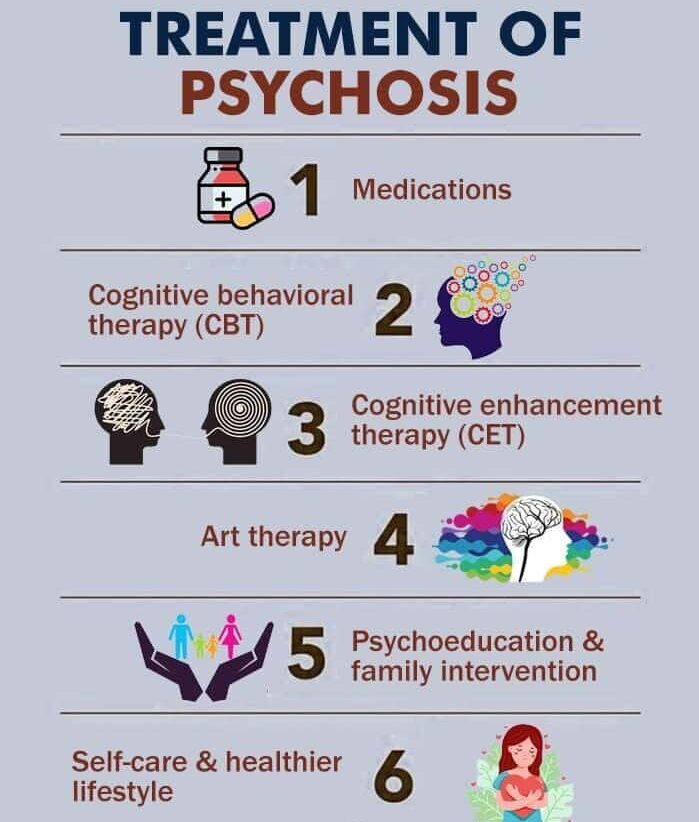
The proper treatment for each of the 5 stages of Psychosis involves a combination of therapy, medication, and lifestyle changes. The treatment plan best suited for an individual depends on their condition, stage, and medical history, as listed below.
1. Antipsychotics
It’s a medication that’s widely regarded as the first line of defense when it comes to treating Psychosis. According to research conducted by the National Institute of Health, it’s considered the gold standard treatment for psychiatric disorders and episodes. It works by blocking the action of the neurotransmitters in the brain that cause the disorder. However, it also has some side effects. Therefore, one should be extra cautious with its use on people who have cardiovascular disease and other long-term conditions.
2. Therapies
Various talking therapies, such as cognitive behavioral therapy, family therapy, and group therapy, are used to treat psychosis. According to a study by NCBI, based on research trials, cognitive behavior therapy and family interventions effectively treat this disorder. It helps people become more vocal about their problems and better manage their symptoms.
3. Inpatient Care
During the critical stage, when a person’s behavior seems to be self-harming and suicidal, medical experts advise inpatient treatment to be a suitable treatment. Residential or inpatient psychosis treatment centers offer trained staff who create a safe environment for stabilization, intensive therapy, and preparation for returning to normal.
4. Rehabilitation Program
Rehabilitation develops skills and self-esteem that allow the person to recover from their Psychosis on their own. NCBI’s research explains the advantages of rehabilitation in the treatment of complex Psychosis. It improves social skills, which further helps the person return to their daily life more quickly.
Conclusion
After understanding these 5 stages of Psychosis, the next step should be to explore the stage of Psychosis one falls into. Every stage needs different attention and treatment plans. It is essential to understand each stage personally before beginning medication or treatment. Treatment efficiency depends not only on medications but also on one’s mindset throughout the healing process. So, let’s embark on this healing journey with compassion and positivity!
You May Read: Can OCD Cause Psychosis? | Can Adderall Cause Psychosis?
Your Journey to a Brighter Tomorrow
FAQs
1. What is the first stage of Psychosis?
The first stage of the 5 stages of Psychosis, also known as the prodromal phase, is accompanied by mild symptoms of Psychosis, which can be challenging to determine. It typically lasts for a few weeks and can even last for months. Early intervention in this stage can help protect against full-blown Psychosis.
2. What is stage 2 psychosis?
Stage 2 psychosis is the acute phase where psychotic symptoms are at their peak. One should seek immediate medical help to prevent the condition from getting severe.
3. Is Psychosis a lifetime phenomenon?
Although Psychosis is not a long-term condition, some people experience it as a recurrent event. However, with proper treatment and prevention, it is possible to reduce the long-term effects of the disorder.
4. How long does Psychosis stay?
Several factors affect the duration of Psychosis. It varies from individual to individual, and the 5 stages of Psychosis. For some, it may last for just days or weeks; for others, it can extend up to a year.
5. Can Psychosis go away?
The ability to recover from Psychosis depends on the nature of the Psychosis. In the case of transient Psychosis, recovery is possible. However, chronic Psychosis requires recurring treatment and supervision and might not go away quickly.

